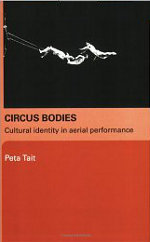
The most important thing to know: Circus Bodies is research. Academic research. Moving through the 140 year history of trapeze acts its focus isn't to provide a narrative account, but to construct a foundation for a series of arguments and observations about gendered performance.
Whether or not its original research is for experts to say, but perhaps only experts will care. For the average reader the prose is (perhaps carefully) flat and unexcited when recounting historical and biographical narratives, and moves to that particular kind of ossified and leaden academic register when it arrives at moments of analysis. A few sample sentences: 'Muscular flying action was received as symbolic of birds, metaphoric of supernatural fantasy figures, and metonymic within abstract idealism, as it also demonstrated the possibility of ambidextrous gender.', 'Thompson explains that freaks were freaks of culture, who materially embodied deviance so that neutralized citizen bodies gained control over imagined fears through exclusionary strategies towards visible otherness including physical difference, gender ambiguity and radical difference.', 'Body-to-body (or -bodies) phenomenologies within live aerial action are metonymical of liveness that is culturally fleshed.'
In a way it's a book to be mined for information, and, as such, is hard, repetitive work. How much value you can extract will depend on your interests – obviously if you're a researcher in the same area (or really want to trace the history of trapeze and who did the first triple) then you'll want to read it (and probably already have), but those with more casual interests would almost be better served by a fact-sheet. For those who do persevere (or skip to the end) the penultimate chapter is the best: focused principally on Archaos, Circus Oz, and Cirque du Soleil but with a few paragraphs on Circus Amok and Elizabeth Streb, it gives a good zoomed-out picture of the New Circus era. It's a little more readable than the other chapters too, presumably coloured and (comparatively) enlivened by the author's first-hand experience. It makes it very obvious that that's what's missing elsewhere.